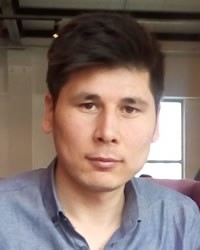Turkmen in Russia

Photo Source:
Anonymous
|
Send Joshua Project a map of this people group.
|
| People Name: | Turkmen |
| Country: | Russia |
| 10/40 Window: | No |
| Population: | 41,000 |
| World Population: | 8,709,600 |
| Primary Language: | Turkmen |
| Primary Religion: | Islam |
| Christian Adherents: | 2.00 % |
| Evangelicals: | 0.00 % |
| Scripture: | Complete Bible |
| Ministry Resources: | Yes |
| Jesus Film: | Yes |
| Audio Recordings: | Yes |
| People Cluster: | Turkmen |
| Affinity Bloc: | Turkic Peoples |
| Progress Level: |
|
Introduction / History
Turkmen culture has been strongly influenced in the past by both Turkic conquerors, who imposed their language on them, and Arabs, who forced them to convert to Islam. They were nomadic for hundreds of years, making their living by raising livestock and selling Persian slaves they had captured. A common saying was that a Turkmen's home is where his horse is. They began to settle in the 19th century. At that point they became semi-nomadic, herding their sheep and camels during part of the year and growing crops in their homeland the other part of the year. In the 17th century, the Turkmen, or Trukhmens as they were called in Russia, migrated into the Caucasus, which has since become part of Russia. Their lack of unity made the Turkmen easy pickings for the expanding Russian Empire. The Turkmen were forced onto collective farms when Turkmenistan became one of the "Soviet Socialist Republics," and their days as nomads came to an end. Turkmen tend to be physically strong and easily able to endure the harshness of the environment. They are characterized by their hospitality, sincerity, and trustworthiness; however, they are also known as being hot-headed and revengeful. The Turkmen are one of the many Central Asian ethnic groups that have a related Turkic language. These languages are not necessarily mutually intelligible, but they often understand part of the other languages. The Turkmen have their own nation, Turkmenistan, where most of them live. There is also a large population of Turkmen in Iran, where they make up about a third of the population, and Afghanistan. They also live in just about all Central Asian nations and there is even a very small number in India.
What Are Their Lives Like?
Turkmen people have fled their home country to urban Russia to find work. Even those who are well educated often must settle for hard labor jobs with long hours for low pay. They send most of the money home to Turkmenistan. They work without permits or medical care. Many share small apartments with other migrant laborers. Like other Central Asian people, the Turkmen are often looked down upon by the Russians.
What Are Their Beliefs?
Nestorian Christians entered Turkmenistan in the fourth century AD; by the beginning of the fourteenth century, though, any lingering trace of Christianity had been totally replaced by Islam. This transition gradually came to influence the political, civil, and economic lives of the people. In 1928, the Soviet authorities launched an anti-religious campaign aimed at the complete destruction of Islam among the Turkmen. The campaign was the harshest and most violent of all anti-Islamic attacks in Central Asia. Today, despite their outward conformity to Islam, mysticism and other past religious traditions are still prevalent among the Turkmen people. However, there is a higher percentage of Turkmen believers in Russia than any other country.
What Are Their Needs?
The vast majority of the Turkmen live without the hope of the abundant life offered by Jesus, the one who wants to give them joy and salvation.
Prayer Points
Pray for the Holy Spirit to give the Turkmen people in Ukraine teachable and understanding hearts. Pray that a strong movement of the Holy Spirit will bring entire Turkmen families into a rich experience of God's blessing. Pray for Turkmen families to be drawn by the Holy Spirit to seek forgiveness, and to understand the adequacy of Christ's work on the cross. Pray for teams of believers to do sustained, focused prayer for the Lord to open the hearts of Turkmen family leaders to experience God's blessing through a movement of family-based discovery Bible studies.